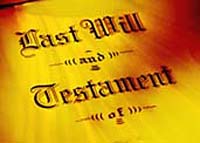 Here's an ethical dilemma. You learn that your late mother had a safe with $100,000 cash in it after the estate has been finalized. Do you pocket the cash and tell no one, or add it to her assets? The temptation is obvious, but the right and legal thing to do is correct the error.
Here's an ethical dilemma. You learn that your late mother had a safe with $100,000 cash in it after the estate has been finalized. Do you pocket the cash and tell no one, or add it to her assets? The temptation is obvious, but the right and legal thing to do is correct the error.
New Jersey 101.5 says in its recent article, "Why it's important for executors to report all estate assets," that the executor of an estate must prepare and file the necessary returns. In doing this, he or she has to collect, value and report all of the assets of the estate.
If a failure to include the cash in the inventory of the estate assets keeps the estate below the reporting threshold and no return was filed, the unpaid tax on the cash will accrue interest. Plus, the estate and executor may be subject to penalties for nonpayment, as well as facing civil and criminal penalties if this failure to file is deemed fraudulent.
 Houston Estate Planning and Elder Law Attorney Blog
Houston Estate Planning and Elder Law Attorney Blog










